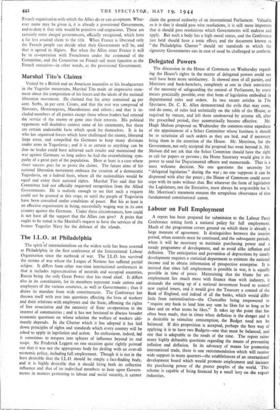Delegated Powers
The discussion in the House of Commons on Wednesday regard- ing the House's rights in the matter of delegated powers could not well have been more satisfactory. It showed men of all parties, and Ministers and back-benchers, completely at one in their conviction of the necessity of safeguarding the control of Parliament, by every means practically possible, over that form of legislation embodied in departmental rules and orders. In two recent articles in The Spectator, Dr. C. K. Allen demonstrated the evils that may come, and do come, of rules laid technically on the table of the House, as required by statute, and left there unobserved by anyone till, after the prescribed period„ they automatically become effective. Mr. Hugh Molson proposed on Wednesday the common-sense expedient of the appointment of a Select Committee whose business it should be to scrutinise all such orders as they are laid, and if necessary bring them to the attention of the House. Mr. Morrison, for the Government, not only accepted the proposal but went beyond it. Mr. Molson did not ask that the Select Commitee should have the right to call for papers or persons ; the Home Secretary would give it the power to send for Departmental officers and memoranda. That is a most welcome decision. No one questions the necessity for " delegated legislation " during the war ; no one supposes it can be dispensed with after the peace ; the House of Commons could never cope with its tasks without that. But whatever the form of legislation the Legislature, not the Executive, must always be responsible for it. Mr. Morrison's statement ensures the scrupulous observance of that fundamental constitutional canon.


























 Previous page
Previous page